For most folks, staying at a hotel is a necessity when traveling. It could be a haven after a long flight or road trip, or just a safe place to keep all of your belongings when you’re out and about in a new town.
A good one can feel like a temporary home away from home, so it’s important that it’s clean. While most hotels have excellent staff for tidying up and providing room service, sometimes things still fall through the cracks, especially if there are hundreds of rooms to get through but the staff is already stretched thin.
Whether you’re staying at a five-star luxury establishment, a mid-priced motel chain, or one of the oldest hotels in the world, it’s always a solid idea to do some general cleaning before you place your head on a pillow for some rest. Below are a few things to wipe down, use, and/or swap out after you check in.
- Switches, handles, and other common touch points
- Coffee makers
- Plates, bowls, and drinkware
- Towels, bed sheets, and other linens
- Bonus: Consider your footwear
Switches, handles, and other common touch points

Consider packing along some disinfectant wipes ahead of your next trip. You can use them on common touch points around a hotel room to get rid of unwanted germs and bacteria. Below are the surfaces that are most likely to be touched multiple times per day, requiring extra clean-up. These spots include:
- Light switches
- Tables
- Bathroom sink faucets
- Nightstands
- TV remote
- Door handles
- Dresser handles and knobs
- Toilet handle
- Phone
- Mini-fridge handle
- Hair dryer
Coffee makers

These days, most hotel rooms come with a coffee maker. However, those coffee makers may not be thoroughly cleaned between guests, and could actually be among the dirtiest things lurking in your room.
To avoid potential problems with mold or bacteria in the device, consider running it through its cleaning cycle first before you try to brew anything. In fact, you may want to pick up some coffee brewer cleaning tablets ahead of your next hotel stay, too. This extra step will help clear the way for your next morning cup of joe, plus it will make things cleaner for the person staying in the room after you. If you want to skip all that work and just enjoy your java, a portable French press is another good alternative to keep in mind.
Plates, bowls, and drinkware

Many hotel chains have replaced reusable drinkware with single-use, disposable cups over the years, but you can still find real glasses at some destinations. There’s no way to really tell how—or when—the glassware in your room was last cleaned. Even if those cups don’t seem dusty or dirty, you may want to give them a proper wash before you use them, just to be on the safe side.
The same is true if you’re staying at an Airbnb or a room with a kitchen. Be sure to clean any plates, bowls, and cutlery you intend to use beforehand with soap and water.
Towels, bed sheets, and other linens

If you want to be really cautious about cleanliness when staying in a hotel room, then it might be a good idea to use your own towels and bed sheets. While it might seem a bit extreme to some, a 2019 UK-based survey revealed that over 12 percent of the more than 1000 people polled actually bring their own linens to hotels, in order to avoid germs.
Don’t want to go to all that trouble? Check with the front desk if you have any questions about when your sheets, pillowcases, towels, and other linens were last cleaned. Housekeeping should be able to give you extras, so you can change everything yourself.
Bonus: Consider your footwear

Even though housekeeping is probably vacuuming between guest stays, hotel carpets can still harbor all kinds of germs and bacteria. To stay safe (and to avoid doing any extra vacuuming during your trip), you may want to consider packing along an extra set of shoes.
Some people prefer to wear a pair of flip-flops when walking around on hotel carpets, while others use shower shoes—like at a gym or dorm—to better guard against athlete’s foot, staph, or other potential infections.
Read More About Clever Travel Hacks Below:
A version of this article was originally published in 2023 and has been updated for 2024.
